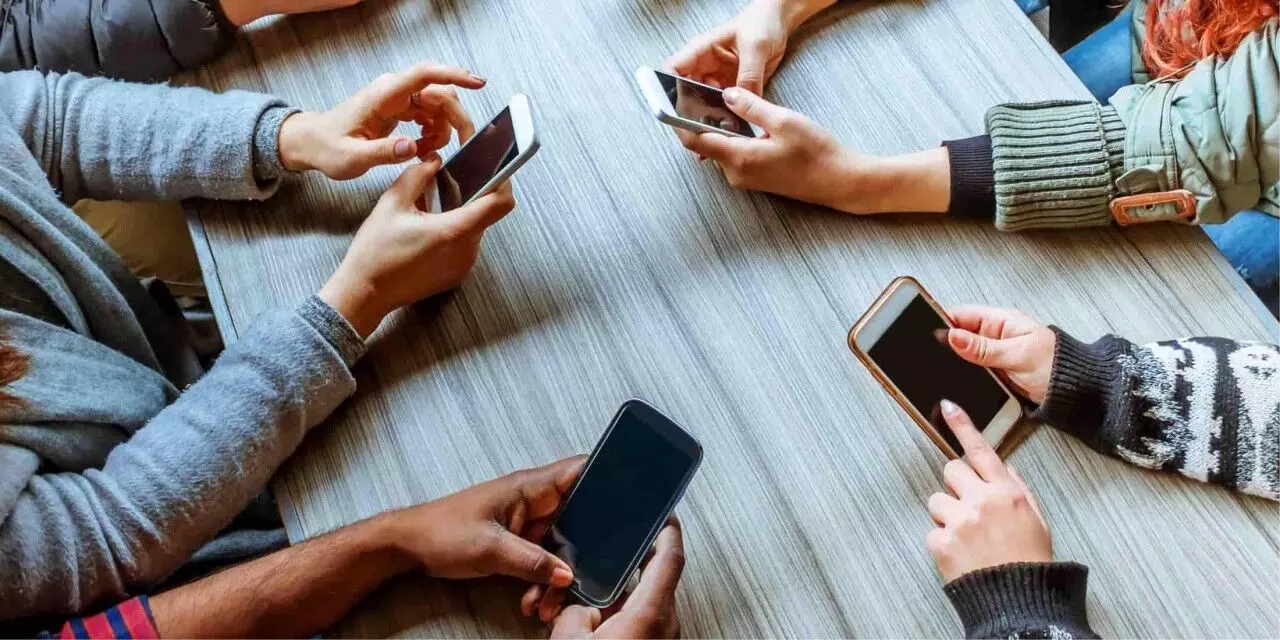Reconnecting with reality
Nomophobia, or the fear and anxiety of missing out on mobile phones, can be addressed through certain strategic practices aimed at minimising our overdependence on the gadget

Imagine this: You’re all set to enjoy a meal with your loved ones, stepping out of your home with excitement. But wait, something’s missing. Your heart skips a beat as you realise your smartphone isn’t in your pocket. Panic sets in, and you rush back upstairs, searching frantically. Eventually, you find it in an unexpected place—the bathroom, where you absentmindedly took it while brushing your teeth. It’s a moment of relief and a reminder of how attached we’ve become to our devices.
Fast forward an hour, and you’re at a cosy restaurant, looking forward to quality time. Yet, within minutes, phones appear on the table. Everyone’s scrolling, tapping, and distracted. Meme-sharing, fact-checking, and texting. How does it feel? Annoying? Infuriating? Or perhaps it is not a big deal because it has become a cultural norm?
Welcome to the world of nomophobia.
What is nomophobia?
It is a portmanteau for “no”+”mobile”+”phobia”.
Nomophobia is a term used to describe the intense fear or anxiety that some individuals experience when they are without their mobile phones or are unable to use them. It’s a modern phenomenon that has emerged with the widespread and constant use of smartphones and connectivity to digital devices.
Downsides of nomophobia
What is the harm, you may wonder? After all, cell phones have been one of the greatest inventions of our time.
Well, excess of anything can be bad. A constant connection to your phone can cause:
* Anxiety and stress;
* Unmindful moments;
* Impaired face-to-face communication skills leading to no real conversations;
* Distraction;
* Disturbed sleep;
* Excessive eating;
* Reduced attention span;
* Memory issues due to constant dependency on technology for information recall;
* Driving and safety risks.
Do you have nomophobia?
(Note that this is not a diagnostic criterion. It is created solely for insight and awareness purposes by the author.)
Be honest in answering the following questions with “Yes” or “No”.
* Do you feel anxious or uneasy when you can’t find your phone or if it’s out of reach?
* Do you check your phone within the first five minutes of waking up in the morning?
* Do you find it difficult to go an entire day without checking your phone?
* Do you experience a sense of panic when your phone battery is running low and you don’t have a charger?
* Do you often keep your phone with you even when you’re at home or in situations where using it isn’t necessary?
* Do you feel compelled to immediately respond to messages, emails, or notifications, even if they’re not urgent?
* Do you frequently interrupt face-to-face conversations or activities to check your phone?
* Have you ever cancelled plans or altered your schedule to stay home and use your phone?
* Do you experience a fear of missing out (FOMO) if you’re not up-to-date with the latest news or updates on your phone?
* Does the thought of being without your phone make you feel uneasy or uncomfortable?
Self-scoring
Count the number of “yes” responses.
* 0 to 2: Your phone usage appears to be balanced, and you may not have nomophobia;
* 3 to 6: You might have some dependence on your phone, but it’s not severe. Consider setting healthy boundaries for phone use;
* 7 to 10: You might be experiencing symptoms of nomophobia. Hit the pause button, and reflect on your phone usage and its impact on your well-being.
Setting boundaries with your phone: a roadmap
Smartphones are not going anywhere. In fact, they may even get smarter than us at some point (due to our sheer dumb dependence on them for everything). Here are a few do-able actions to help curb this constant need to connect, and reduce your dependence on devices:
* No mobile zones: Set up clear-cut areas in your house where phones are not allowed, for example, not on the dinner table, not in the bathroom, etc. Set up clear-cut areas outside of the house, for example, not while driving, while crossing the road, etc.
* Silence it: Set the notifications off. Put the airplane mode on when focusing or talking to a friend in person.
* Delay gratification: Avoid the need to check instantly for information. Delay the reply to people, and let them know you are practicing this.
* Train mindfulness: One thing at a time. Don’t multitask with the phone. Train yourself to be bored more by doing nothing but mindless scrolling.
* Dumb phone: Consider deleting unnecessary apps. Trade down to a basic phone as your main phone. Use computers for advanced searches.
* Establish digital detox days: Consider taking time off. Start by building up to just 20 minutes a day as a practice. Sometimes, just leave your phone at home when going for a run or running an errand nearby.
If you still find your increased dependence on devices overtaking you, then it’s best to see a mental health professional to understand the underlying causes of these urges.
Send your questions to [email protected]



